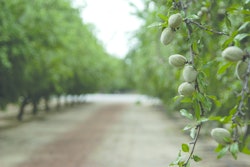The Bureau of Labor Statistics reported this week that consumer prices for fruit and produce in February rose 0.1 percent, driven higher by a 0.4 percent increase in the food index, the largest increase since September 2011, according to the report, but a research economist with the U.S. Department of Agriculture says it is too soon to assign blame for fresh produce inflation on the California drought.
The index for fruits and vegetables rose 1.1 percent after five consecutive declines, according to the report, though the index for fresh vegetables declined 0.2 percent.
The average price for red delicious apples in February was $1.31 per pound, up from $1.28 per pound in January but down compared with $1.43 per pound the same time in 2013.
The report said the average retail prices for bananas and tomatoes in February were virtually unchanged compared with January.
The food inflation seen this year is normal and not related to the drought so far, said Richard Volpe, economist with the U.S. Department of Agriculture’s Economic Research Service. While food prices in so far in 2014 have increased more than in all of 2013, Volpe said that fact says more about the flat prices of 2013 than anything out of the normal for 2014.
“So far in 2014 we are on track for a normal year,” he said.
In February, the USDA projected that consumer prices for all food would increase 2.5 to 3.5 percent in 2014; the next projection will be issued March 25. In 2013, the USDA said food price inflation was just 1.4 percent, with fresh fruits rising 2 percent and fresh vegetables climbing 4.7 percent.
For fresh fruits, vegetables and fluid milk — the commodities expected most vulnerable to California’s water crisis — Volpe said there is “no discernible impact” from the drought so far. The index for vegetable prices declined in February and the fruit index increase was linked to higher apple prices, which are not linked to the drought in any way.
Fluid milk prices are higher, but he said it is too soon to pin that on the drought, because cold weather and higher exports have influenced prices hikes in addition to a decline in dairy herds.
The drought could cause price hikes beyond this year, he said. Higher costs of groundwater and irrigation could cause growers to take acreage out of production, which could influence supply this year but also in future.
“It is a legitimate concern,” he said.
The USDA is gathering information on the effect of the drought and will soon publish a “drought page” on its website to reflect the information it is receives about the drought’s effect, Volpe said.
To read more, click HERE.

















